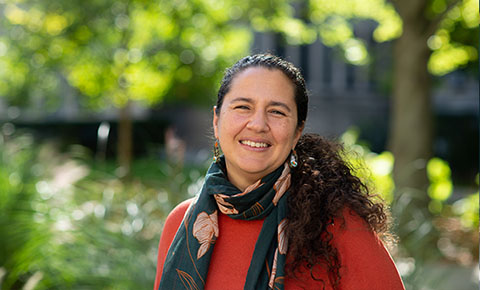Bang Receives NSF Grant to Support Indigenous Science Education

Northwestern University’s Megan Bang has received a five-year, $3 million collaborative grant from the National Science Foundation to create a model of Indigenous science education that's focused on 21st century challenges around socio-environmental issues, like climate change, adaptation, and sustainable decision-making.
The collaborative project brings together scholars from multiple universities and tribal communities in the Great Lakes and Pacific Northwest, including the Little Traverse Bay Bands of Odawa Indians; the Tulalip Tribes; the Chicago American Indian community; and the Seattle American Indian community.
In addition to Bang (Ojibwe and Italian descent), the project will be led by Filiberto Barajas-López, (P'urhépecha), associate professor and director of Native Education Certificate Program at the University of Washington-Seattle; and Anna Lees (Little Traverse Bay Bands of Odawa Indians), associate professor at Western Washington University and director of the Early Childhood Education program.
“The need for science education that can help create just, culturally thriving and sustainable worlds is perhaps the most important issue of our times,” said Bang, professor of learning sciences and psychology and senior vice president of the Spencer Foundation.
“Indigenous peoples have persistently been under-represented in science, reproducing systemic inequalities,” she added. “It’s imperative we develop models of science education that recognize the deep expertise, perspectives, and leadership of Indigenous communities.”
The tribes will play a prominent role in all aspects of the research, with community members acting as both research participants and co-designers, Bang said. In addition, Indigenous graduate fellows and post-doctoral fellows will be supported by senior scholars.
“This helps build and strengthen the capacity of Indigenous communities to conduct research, develop scholars, and deliver STEAM and teacher education from the communities’ perspectives,” she said.
Ultimately, the project will create professional learning programs to help support additional communities as they develop their own programs. In addition, the project will study how educators develop teaching methods in such environments.
The five-year project has three phases:
- ISTEAM summer camp program: ISTEAM – Indigenous Science, Technology, Engineering, Arts, & Math serves Indigenous youth. Community members from each of the three participating communities will co-design the program with the research team (university and tribal scholars and educators, graduate students, post-doctoral fellows, and research assistants), who will deliver the program to their youth as camp facilitators.
- Professional development: A program for educators will be co-designed with community members and the research team.
- Research: Scholars will engage in mixed methods inquiries with children and adults to study their thinking and make decisions related to complex social and ecological issues, such as the shifting climate. In addition the team will examine educators pedagogical practices and trajectories of learning.
A former pre-school teacher, middle school teacher, and GED educator, Bang has long focused on community-based settings and education. She is a member of the National Academy of Sciences and she serves on the Board of Science Education for the National Academies of Science.
The National Science Foundation grant is titled “Collaborative Research: Intergenerational Learning, Deliberation, and Decision Making for Changing Lands and Waters.” The work is funded by the agency’s Advancing Informal STEM Learning (AISL) program, which supports new ways to design and develop of STEM learning in informal environments.